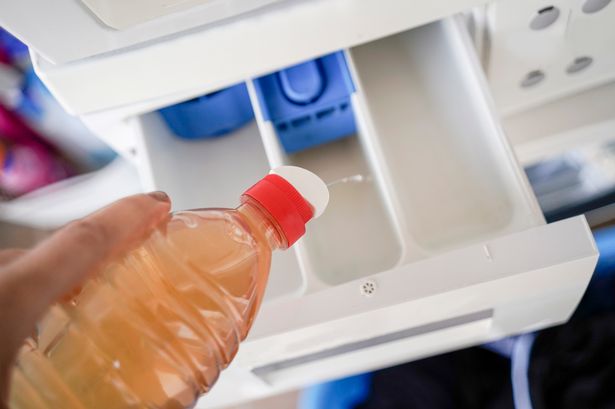People are being warned certain viral cleaning hacks on social media could end up doing more harm than good.
While natural cleaning ingredients are growing in popularity for being eco-friendly, some can cause irreversible damage to work surfaces, with experts now revealing which ones to avoid. The hashtag '#CleanTok' currently has a whopping 26.9 billion views on TikTok, as many Brits have been using newfound hacks to clean their homes – including making their own cleaning solutions with natural ingredients.
A new study from Wickes has revealed that two-fifths (41%) of Brits have made the switch to homemade cleaning solutions, such as white vinegar, lemon juice and bicarbonate of soda. While these ingredients have long been associated with being alternative cleaning products, what is lesser known is the damage they can do in the home if not used correctly – especially white vinegar.
READ MORE:Little-known 'invisible' breast cancer symptom you may not know about
READ MORE:'I had teeth like a burst piano but refused to get Turkey teeth'
To help people keep their kitchen surfaces safe, Wickes has enlisted experts to shed light on how this alternative cleaning product should be used, as well as the best ways to avoid causing irreversible stains to wok surfaces and hobs.
Home services business Fantastic Services and cleaning expert Nicola Rodriguez from the home improvement business Essex House Dolly have teamed up to share their experience and wisdom on the topic, advising on what people need to know before following cleaning advice on social media.
Knives: According to the experts, vinegar can damage the finish on knives and leave the edge pitted. Other common metals in the kitchen that you should keep away from vinegar include aluminium and copper. The best cleaning option is dishwashing liquid and warm water.
Marble: "The vinegar dulls the stone but also causes spills to penetrate the stone's surface, leaving permanent stains and etching. Vinegar easily damages any sealers applied to a stone surface," the cleaning experts warn.
Granite: “It leaves acids on worktops causing it to etch.”
Eggy spills: “The acidity of the vinegar causes the egg to coagulate which then makes it harder to remove.”
Wood furniture: “Only use if diluted as the mild acidity again can damage the wood.”
Dishwasher: “Never put in the dispenser drawer as the acid is strong enough to melt the rubber gaskets. Instead, I’d recommend putting a cup of vinegar on the bottom of your rack and then start your cycle.”
Stainless Steel: “Never use it on this surface as it will cause corrosion.”
Cast Iron: “It will cause pitting and rusting by removing the seasoning oils that protect the iron.”
Electronics: “Vinegar damages the anti-glare coating on screens such as TVs, mobiles and computer screens.”
Rubber Gaskets & Hoses: “Vinegar will cause the rubber to disintegrate.”
Cleaning specialist Heligert Gojda added: “The damage caused by using improper cleaning products on surfaces like natural stone or ceramic hobs can be irreversible. Acidic substances can etch the stone's surface, leaving marks that can't be polished away.
“Additionally, scratches on glass or ceramic hobs might also be permanent. Therefore, it is clear why proper cleaning care and maintenance are essential.
“Warm soapy water and a soft cloth or sponge are effective and safe for kitchen worktops, hobs, and most general kitchen surfaces. However, specific cleaning products designed for the surface material are often the best choice, e.g., granite cleaner for granite countertops or a glass ceramic cleaner for ceramic hobs.”
When it comes to some of the most common cleaning mistakes, Heligert said: “One common mistake is using abrasive materials or cleaners that are too harsh for the surface and neglecting to clean up spills promptly, allowing them to set in.
“In addition to these, using excessive force when scrubbing is another. This can lead to scratches on surfaces like the ceramic hobs in your kitchen. It's crucial to follow the manufacturer's recommendations and use suitable cleaning products and tools so you do not have to deal with bigger issues.”
Get the latest news from Merseyside's courts by signing up to our newsletter
Life through a new lens. We are Curiously. Follow us on TikTok, Instagram, Facebook and Twitter.

